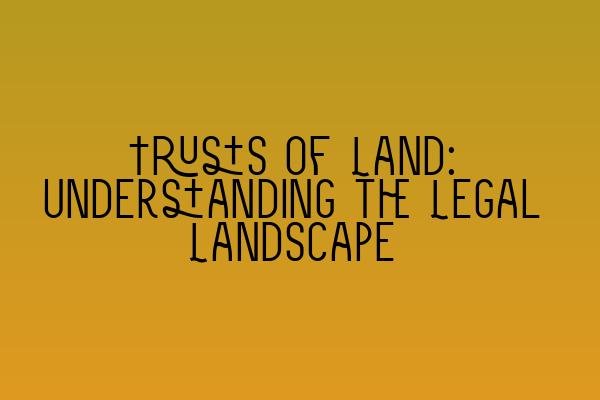Trusts of Land: Understanding the Legal Landscape
Welcome to SQE Property Law & Land Law, the leading experts in property law and land law matters. In this blog post, we will delve into the intricate world of trusts of land, providing you with a comprehensive understanding of the legal landscape surrounding this crucial aspect of property ownership.
Before we begin, it’s essential to define what trusts of land are. A trust of land is a legal arrangement where one party (the trustee) holds and manages the property on behalf of another party (the beneficiary). In essence, trusts of land allow for the separation of legal ownership (held by the trustee) from beneficial ownership (held by the beneficiary).
Now that we have established the basic concept, let’s explore the key aspects of trusts of land:
1. Types of Trusts of Land:
There are several types of trusts of land, each with its particular characteristics and purposes. The most common forms include bare trusts, express trusts, resulting trusts, constructive trusts, and charitable trusts. Understanding the distinctions between these types is crucial in determining the rights and obligations of the parties involved.
2. Creation and Formalities:
To create a valid trust of land, certain formalities must be followed. Generally, trusts of land must be in writing, often in the form of a declaration of trust or a trust deed. The document must clearly identify the trust property, the names of the trustee and beneficiaries, and the terms of the trust. Compliance with these formalities ensures the enforceability and validity of the trust.
3. Trustees’ Duties and Powers:
Trustees play a pivotal role in managing the trust property and safeguarding the interests of the beneficiaries. They owe fiduciary duties, including the duty of loyalty, the duty of care, and the duty to act in the best interests of the beneficiaries. Additionally, trustees may be granted specific powers to administer the trust property, such as the power to sell, lease, or mortgage the land.
4. Beneficiaries’ Rights and Entitlements:
Beneficiaries hold the equitable interest in the trust property and have certain rights and entitlements. These rights may include the right to occupy, use, or receive a share of the income or proceeds from the trust property. Understanding the extent of beneficiaries’ rights is crucial in resolving disputes and ensuring fair and equitable outcomes.
5. Disputes and Resolution:
Disputes may arise in trusts of land matters, often concerning issues like the interpretation of trust terms, breaches of trustees’ duties, or claims for beneficial interests. Resolving these disputes requires a thorough understanding of trust law principles and case precedents. Seeking legal advice from property law experts, such as SQE Property Law & Land Law, can help ensure that your rights are protected and your interests are well-represented.
In conclusion, trusts of land form a fundamental aspect of property law, providing a mechanism for the separation of legal and beneficial ownership. Understanding the legal landscape surrounding trusts of land is essential for property owners, trustees, and beneficiaries alike. By familiarizing yourself with the types of trusts, creation formalities, trustees’ duties, and beneficiaries’ rights, you can navigate trust-related matters with confidence.
If you’re interested in further preparation for the SQE exams or require assistance in any property law or land law matters, we recommend our related articles and services:
– SQE 1 Practice Exam Questions
– SQE 1 Practice Mocks FLK1 FLK2
– SQE 2 Preparation Courses
– SQE 1 Preparation Courses
– SRA SQE Exam Dates
At SQE Property Law & Land Law, we are dedicated to providing comprehensive legal support and guidance for all your property law needs. Contact us today to speak with our experienced solicitors and seize a strong position in the legal landscape.
